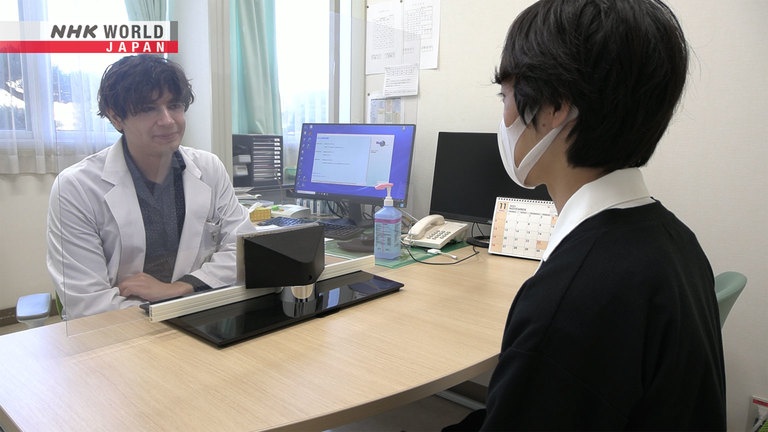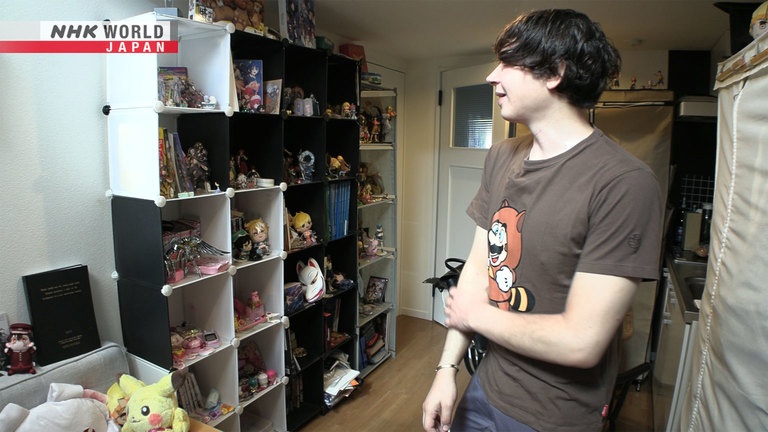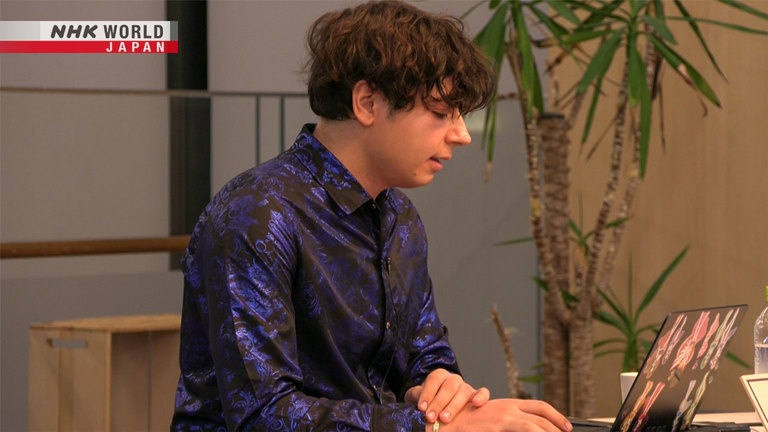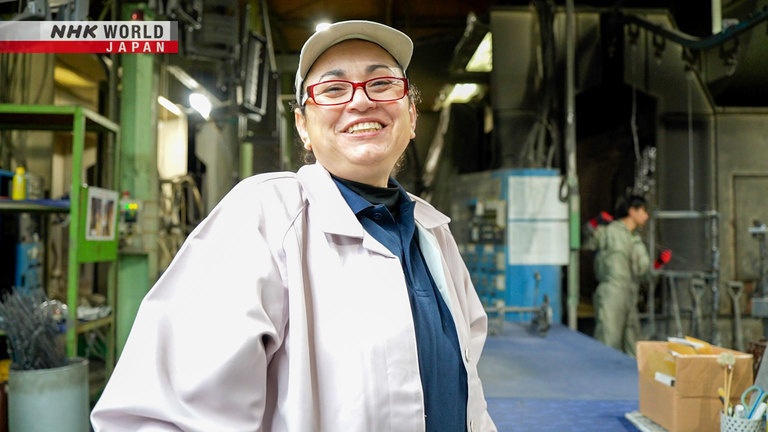Trust in the Healing Power of Anime
We meet Italian Francesco Panto, a psychiatrist in Saitama Prefecture who develops a therapy method that makes use of Japanese anime, as well as Brazilian Silvia De Souza who works at a coating plant in Toyama.




Transcript
Where We Call Home.
Hoping to bring emotional support to as many people as possible is this young psychiatrist from Italy.
Hi, I'm Doctor Panto.
What's been bothering you?
Doctor Francesco Panto.
He's a fervent anime enthusiast.
Thanks to this series,
I found a place where I belong.
He's integrating anime into a new kind of therapy...
...to better help those struggling with mental health issues.
I have difficulty expressing
my opinions to others.
But being available for his patients is easier said than done.
A single doctor can only do so much.
I sometimes feel powerless.
Let's follow Francesco's efforts at the frontline of psychiatric care.
An hour train ride from central Tokyo - Hanno City in Saitama Prefecture.
In this quiet town abundant in green spaces is a facility dedicated to supporting people's emotional well-being.
The Minami Hanno Hospital.
They focus on treating patients with mental health issues,
providing counseling and assistance in social rehabilitation.
They also treat a lot of patients with schizophrenia.
The center has been part of the local community for over fifty years.
This inner courtyard is nice.
It's so relaxing.
Italian-born Francesco Panto has been working here as a psychiatrist for three years.
Come in.
Good morning!
One of his patients today is a university student whose difficulties with social interactions have been giving him insomnia.
Recently, have you had any issues
when communicating with others?
Well...
I still have the same problem.
I have difficulty expressing my opinions
to others. It's been troubling me.
- I make an effort to listen to others.
- I see.
Getting a patient to open up then finding and removing the source of his or her problem is crucial.
Francesco has recently been working on a new method of treatment.
Is there any anime you're into lately?
It doesn't matter which one.
- "That Time I Got Reincarnated as a Slime."
- Ah, yes.
It's touching. The action is great.
Watch it again, and find a scene
you particularly like.
Write about it and we can discuss it
together next time.
It's a method that uses any anime series or film a patient likes.
Because it's still in the research stage, he employs it with his patients' permission.
It's a treatment method
I simply named anime therapy.
Using a character as a role model...
a patient relates with their actions
and personality to help them change.
Using the patient's answers to a questionnaire about a character or scene that spoke to him,
Francesco will help him find a solution to his problem.
Anime often depicts in detail how characters feel and evolve emotionally,
which makes it easy to find parallels with a patient's own situation.
This student hoped to meet the expectations of his parents
- both of them doctors - and tried to enter medical school, but failed.
Instead, he majors in dentistry.
It's not what I wanted to do.
I wanted to study literature.
But I couldn't find the courage
to tell my parents how I truly felt.
It's said that, in 2020, about six million people in Japan suffered from a mental health issue.
Numbers have been on the rise over the past decade.
Francesco sees the Japanese tendency to hide their true nature under a social facade,
and the resulting gap between the two, as a cause of emotional distress.
I put the emotional burden on myself
rather than on my friends.
Being liked by others can impact
our chances at success.
So, it can be hard to say "No."
In Japan, people sometimes have to
repress their feelings to fit in.
It's to better coexist in society.
But if one feels their identity
is "erased" in that process...
it has a negative emotional impact.
Japanese can lose themselves somewhere between their true nature and their social facade.
It's actually something Francesco too experienced.
Francesco was born on the island of Sicily, famous for its tourism industry.
In contrast with his cheerful and outgoing older sister, he was more of an introvert,
preferring drawing and reading.
"Boys like soccer."
I didn't like that kind
of gender stereotypes.
When I went out, I felt I had
nothing to do, that I didn't belong.
This is so cool!
It was Japanese anime broadcasted on Italian television that helped him overcome his feeling of solitude.
I like "ugly cute."
I think I want this.
And this, too.
Anime gave me a place where I belonged.
The heroes are also kind
and pure-hearted.
It made me accept my own weakness.
With its characters depicted with relatable realism,
Japanese anime helped Francesco embrace his own individuality.
And so, it was his love for anime culture that brought him to Japan in 2015 to study psychiatry in graduate school.
Three years later, he obtained his license to practice.
Believing in anime's potential for re-examining oneself,
he's been researching ways to use it in therapy.
Anime therapy encourages self-evaluation.
It facilitates introspection.
And therapy becomes more effective
if a patient relates to a specific title.
It's very appealing.
Come in.
Long time no see.
How have you been?
Francesco insists on carefully listening to what his patients have to say.
How have you been feeling lately?
With your insomnia especially.
- I've been getting more sleep.
- That's good.
He puts special emphasis on meeting his patients' eyes.
He says it helps build mutual trust.
With time, a fractured limb recovers.
But in psychiatry, patients
must change their consciousness.
We patiently help them.
With no miracle surgery or wonder drugs to cure patients,
a psychiatrist must take time to get to the root of their problems.
But, giving each patient enough time can be difficult.
Japan's national healthcare allows everyone to receive treatment at low cost.
As a side effect of that, psychiatrists must see a lot of patients.
In his three hours of doing consultations in the morning, Francesco has to see over twenty outpatients.
This limits the time he can allot to each of them.
In the afternoon, he makes the rounds seeing patients who are hospitalized.
I'm here.
Any restrained patients?
No, but there are three in isolation.
And today is his weekly turn to be on call.
He must be stay at the hospital overnight and be available to help with emergencies.
Yes. Yes.
- An emergency?
- Yes, it's rather urgent.
There are many elderly patients.
At any moment, he can be called to help.
This leaves him no time to take a breath; he must stay at the ready.
I return here, praying
nothing bad happens.
Can he provide sufficient support to those in need of his help?
It's a question that never leaves Francesco's mind.
I always wonder
if I'm doing enough as a psychiatrist.
One doctor can only do so much,
see a limited number of patients.
Some may say doctors
are "amazing" or "cool."
But I sometimes feel very powerless.
One doctor has been watching over Francesco as he struggles with this harsh reality.
- Dr. Panto.
- Dr. Tsunoda.
- Busy today?
- Well, some patients needed help.
Hospital director Tsunoda Kenichi often takes some time to talk to him.
Francesco expresses his concerns.
I'd like to give each patient more time.
But I guess it's difficult.
In Japan, hospitals get many patients.
If we give too much time to each,
others will complain.
I understand your wish
to give patients' more time.
We'll have to make do.
Yes.
I'll keep doing my best...
and try to find what's best
to treat our patients.
Stay strong.
How can Francesco be there for his patients with such limited time?
This very issue is what encouraged him to use the power of anime to delve deeper into patients' problems and find solutions.
Today, Francesco does an online consultation with the university student to whom he gave a questionnaire.
He watches a scene the patient mentioned in his answers.
It's a deal!
The series called "That Time I Got Reincarnated as a Slime"
follows a human transported into a fantasy world where he tries to build a society everyone can share.
It's not just about sharing impressions.
The key is to find points the patient
and character have in common.
What message can Francesco convey to his patient through this anime?
Hi. Good to see you.
I gave you a bit of homework.
I'd like to discuss that.
The student found a scene which overlapped with his own difficulty to voice his opinions.
It's a moment when something said by the main character Rimuru triggers events that cause the death of many allies.
Just as you ordered us, Lord Rimuru,
we welcomed all humans. But the results...
It's my fault... my fault.
Because they followed my orders.
The patient worries that, just like what happened to the story's protagonist, his words might harm those around him.
Rimuru blamed himself for what he said.
What did you think of that?
Do you feel afraid of speaking out,
afraid of expressing yourself?
Yes, very often.
I get scared.
But Rimuru did it in spite of his fear...
in spite of being worried
about the consequences of his words.
What did you think?
I don't think there's anyone out there
who speaks without being afraid at all.
Yeah, I guess everyone feels
a little worried when they speak.
It's OK to be afraid.
Nobody speaks with full confidence
that their words won't offend anyone.
No need to try to be perfect.
Yes.
To listen to what others have to say,
then express my own opinion clearly.
I want to be able to do that.
Francesco was able to impart to him the importance of finding the courage to express himself.
The university student has been doing anime therapy with Francesco for more than a year.
He explains he's seeing gradual improvement.
I think there are more instances
where I want to speak actively.
I realize I don't have to be
so intimidated by others.
I'm glad I did this.
Francesco's development of anime therapy is ongoing.
I found anime therapy very interesting.
A book compiling his research was published.
Now interest in anime therapy is growing beyond the medical world.
I was bullied as a child.
Francesco wishes to be there for his patients as much as possible.
The path ahead has many obstacles.
What we can do is limited.
I just have to keep going.
It's hard at times, but I know
I was right to pursue psychiatry.
I can't imagine myself
doing anything else.
- Will you keep working in Japan?
- I will.
I don't see leaving Japan as an option.
Excuse me.
Just like the heroes of anime that brought him to Japan,
Francesco's quest in this faraway land in search of new ways to support patients continues.
Gotta go.
Bye!
Hi! I'm Silvia De Souza.
I work in quality control and packaging.
This company is like my second home.
Toyama City, Toyama Pref.
Silvia works at a company
that applies coatings to metal parts.
7:30 a.m.
arriving at work.
Good morning!
Morning!
Is there a blow gun you're not using?
Use that basket.
She gives workers directions
so the production line moves efficiently.
This plant coats materials with
a technique that uses static electricity.
They coat a total of over
400 different metal parts.
8:30 a.m.
work starts.
Silvia is in charge of inspecting
and packaging each coated part alone.
Quality control requires both speed
and careful attention.
Coating defects such as dripping
or uneven application...
have to be quickly detected.
Thanks to years of experience,
Silvia spots a slight color irregularity.
The coating was a bit too thin.
Making adjustments with spray-on coating
is also part of Silvia's work.
I don't want parts to be sent back.
I want to do quality work.
Silvia performs a variety of tasks,
making sure to do everything in time...
so that the production line
keeps going non-stop.
Many people mistakenly think factory work
involves only physical labor.
But if we don't use our head,
work becomes inefficient and more tiring.
In Brazil, Silvia ran a restaurant
with her 2nd-generation Japanese husband.
But they eventually had to close up shop due to recession.
In 2002 they moved to Japan to find work.
Unable to speak Japanese at the time,
Silvia worked temp jobs...
in factories and doing cleaning.
Having been laid off twice due to
employers cutting down on temp workers...
her life in Japan was uncertain.
My husband wanted to go back
to Brazil, but I didn't.
I wanted to stay in Japan.
3 years after coming here,
I got my permanent residency.
Japan feels like my home.
Silvia and her husband now live surrounded
by their three children and grandchildren.
This is Hasegawa-san, my supervisor
who helped me become a regular employee.
Sounds like you regret it.
She came to work here one year
as a temporary worker.
But she wanted to quit doing temp jobs
and do work that paid a bit more.
I didn't want her to leave, so I asked
management if we could hire her regularly.
Our president agreed,
so she became a regular employee.
I wanted to be a regular staff
but I thought I couldn't.
My dream came true.
It's thanks to you.
She puts so much effort
and care in her work.
And she can do it amazingly quickly.
When Silvia takes a day off,
we say, "It's gonna be a rough day."
"What are we gonna do without her?"
- I'm taking tomorrow off then.
- No way!
Here's my treasure.
My company name tag.
I got it when I became a regular.
Back in Brazil, I wrote
in my Japanese notebook...
"I'm going to Japan."
And, "I'll be a company employee."
My teacher saw that and chuckled.
Maybe she knew it'd be difficult.
But I made it a reality.
Ten years after becoming regular,
I'd saved money and bought...
an old house right by the sea.
My dream now is to one day
open a simple café in that house.
I found that dream thanks
to this company. I'm so happy.